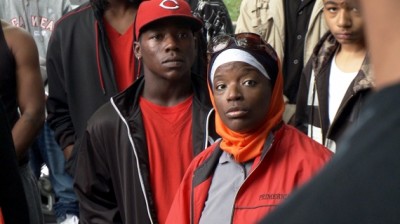| Reviews & Columns |
|
Reviews DVD TV on DVD Blu-ray 4K UHD International DVDs In Theaters Reviews by Studio Video Games Features Collector Series DVDs Easter Egg Database Interviews DVD Talk Radio Feature Articles Columns Anime Talk DVD Savant Horror DVDs The M.O.D. Squad Art House HD Talk Silent DVD
|
DVD Talk Forum |
|
|
| Resources |
|
DVD Price Search Customer Service #'s RCE Info Links |
|
Columns
|
|
|
Interrupters, The

Sticks and stones may break your bones, the saying goes, but as Ameena Matthews says, "Words'll get you killed." Ameena works as a "Violence Interrupter" for CeaseFire, a Chicago-based organization that sees violence as an infectious disease--"We've been taught violence," notes the organization's director, Tio Hardmian. "Violence in a learned behavior." The group considers Chicago (specifically the Inglewood area) a "war zone," and knows that it cannot fix that, by itself, on a macro level. But on a micro level, in one-on-one interactions, by being present at moments when negative, life-altering decisions are made, they can make some kind of a difference.
Their story is told in The Interrupters by Steve James, director of Hoop Dreams and several other masterful documentaries; he focuses primarily on three "interrupters": Matthews, Cobe Williams, and Eddie Bocanegra. Each have a unique tale to tell, of a life that began on the wrong side of the law before they chose to use their street smarts to do right by their neighborhoods. James and his crew follow them during a period in which Chicago became the flashpoint for the issue of youth violence, following the harrowing death of Derrion Albert, a Chicago high school student whose brutal murder in a street fight was captured on a cell phone video. Eric Holder and Arne Duncan visited. Pronouncements were made. But nothing changed.
The interrupters, meanwhile, fight their own small battles. Cobe is helping an old friend whose two teenage sons are in different "cliques" and are therefore at each other's throats at home (even more than most teenage sons, that is), to the point of threatening each other's lives. Ameena is in a constant back-and-forth with a troubled teen named Capryhsa--fighting her, humoring her, pushing her. We meet both Cobe and Ameena's grandmothers--older women who cared for them, looked after them, helped them when they could, walked away when they couldn't, and are proud of what they've become.
Ameena dominates the film a bit, and rightfully so; the daughter of a notorious Chicago gang leader, now a married Muslim mother, she is a pure force of personality--fearless, funny, and obviously brilliant. Early in the film, she throws herself right into the middle of a scrappy, messy melee (and brings the cameras in with her--the resultant footage is rather shocking) to stop it from going a step too far; later, she takes on a group of hard-looking characters and lets them have it, with nary a flinch crossing her stern face.
We fear for her a bit in those scenes; the stakes are real, as we're reminded when James interviews the husbands and wives, or when Tio goes to visit an interrupter who got shot. It's a scary business, but the desperation and sadness of the situation compels them, and becomes real over the course of the film's leisurely 144 minutes. Midway through, there is a heartbreaking montage of makeshift memorials, candles and flowers and teddy bears and Hennessy bottles on a wall or near a car to mark yet another murder, a wall in Altgeld Gardens where the names of the dead are written. The camera finds, written between them, three words: "I am next."
James uses no narration (at least, none from any non-participants), and uses a clean, smooth editorial style (he edited with Aaron Wickenden). The picture is, it must be noted, a bit too long, and becomes somewhat repetitive in its second half; it also might have benefitted from a bit more than its fleeting allowances that their interruptions don't always work ("They're always giving these speeches," one kid notes, "but everybody don't think the same way"). But sometimes they do, and those personal stories make for the film's most compelling moments. Its epilogue closes with Solomon Burke crooning a slow, sad, Chicago blues ("Please don't give up on me," he pleads) and we see the surprising fate of "Flamo," a wired, angry fellow with a short fuse whom Cobe caught at a very bad moment earlier in the film "I can respect ya'al, what you're trying to do," he told them then, "but fuck that." In the final moments of The Interrupters, though, we understand what happens when someone is there at a key moment, and what a difference that mere presence can make.
Jason lives in New York. He holds an MA in Cultural Reporting and Criticism from NYU.
|
| Popular Reviews |
| Sponsored Links |
|
|
| Sponsored Links |
|
|
| Release List | Reviews | Shop | Newsletter | Forum | DVD Giveaways | Blu-Ray | Advertise |
|
Copyright 2024 DVDTalk.com All Rights Reserved. Legal Info, Privacy Policy, Terms of Use,
Manage Preferences,
Your Privacy Choices | |||||||











